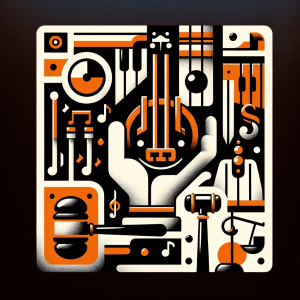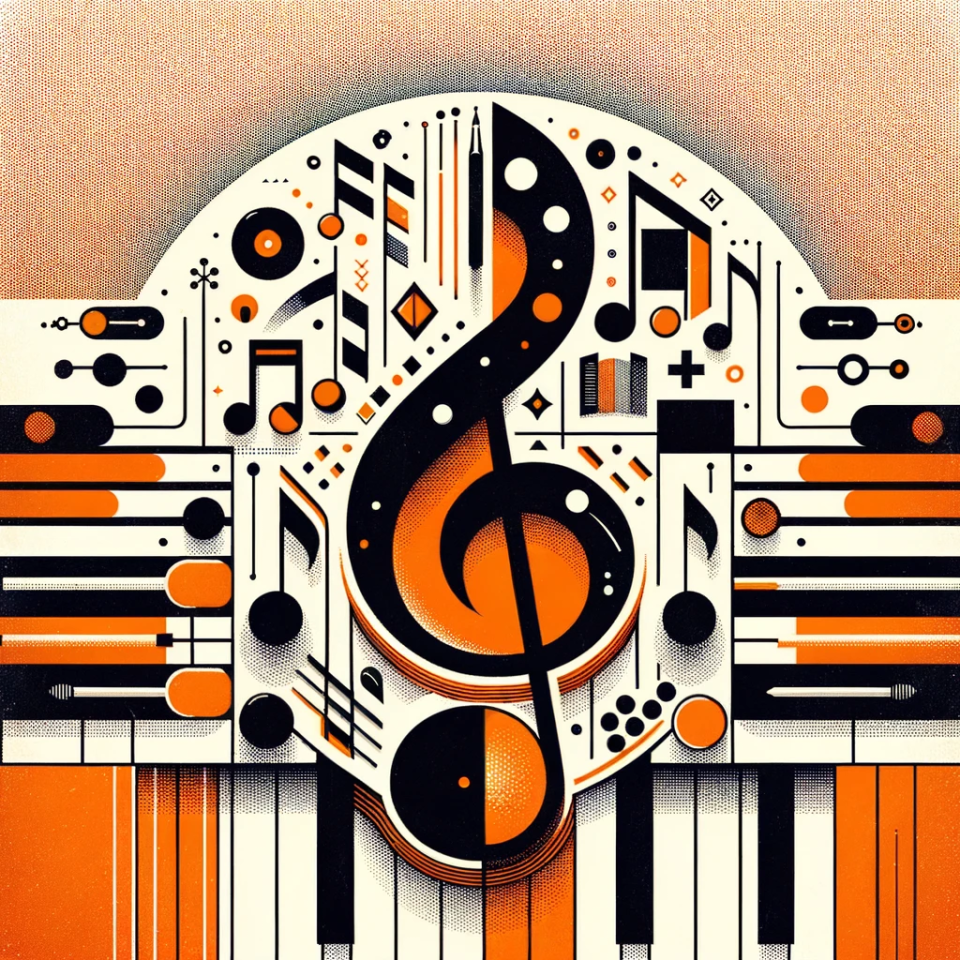By the time an artist comes to talk to a lawyer, it’s usually already too late.
As an artist, it’s sometimes painful to think about having to work the business side of things. After all, we only have so much available time in the day, and we need to focus on our creative output; our “product”.
However, consider the potential time we lose if we don’t have important business aspects figured out. There are countless stories of artists who turned a blind eye to the fine print, and it ended up costing them dearly down the line. Some research in the short term can keep you from experiencing big problems later.
In today’s world, where digital distribution and AI are changing the way everything works, it is crucial to have a keen handle on the basics of business. Knowing how copyright works when it comes to artistic works will give you a keen edge as you continue to hone your craft and release more projects.
What is Copyright in Music?
In music, copyright can be defined as “a legal right granted to the creator of an original musical work”. This breaks down into multiple subcategories because copyright can apply to the lyrics of a song, the music in a song, and the reproduction and distribution of the work… it can get complex very quickly.
To keep this article simple, we’re going to zero in on how copyright applies to the independent artist (unsigned) and what foundational plans you need to have in place as you’re preparing to take over the world with your music.
As an independent artist who writes original material, you will want to ensure that you have copyrighted your works before you publish or distribute anything online. That means securing appropriate copyright for your lyrics, your song melody and arrangement.
In Ontario, copyright in music is automatically established upon the creation of an original work, such as a recording or written music score. This means that the moment you create a piece of music and record it or write it down, it’s already protected under copyright law. However, while not mandatory, registering your copyright with the government provides certain legal advantages, such as proof of ownership in case of infringement and the ability to seek certain monetary remedies in court proceedings. This can be done through the Canadian Intellectual Property Office (CIPO).
Is Registered Mail A Good Method to Copyright My Music?
You have probably heard of the method of handling copyright by sending yourself a copy of your works on disk or cassette (what’s that?!) via registered mail. This, often referred to as the “Poor Person’s Copyright,” is a commonly used method among songwriters. The idea is to have a dated and sealed envelope with your work inside, which can act as evidence of the creation date in case of a dispute.
However, it’s important to note that while this method has been considered reliable and has been held up in court, it is not a formal method of copyright registration and may not offer the same level of legal protection as government registration.
Your best bet is to register the work through an organization like CIPO, even though it comes at a cost. It’s one of those “better safe than sorry” situations if anyone comes forward with an infringement claim against your work.
How Long Does the Copyright Last?
In Canada, the duration of copyright protection depends on the type of work and the life of the author. For musical works, copyright typically lasts for the life of the author plus 50 years following the end of the calendar year in which the author dies. This means that the protection will expire on December 31st the 50th year after the author’s death.
Rights of a Copyright Holder

So as a copyright holder, what rights do you have? This gets into discussing the nuances of derivative works, and licensing.
Derivative works refer to new, original work that includes or is based on previously existing work. In music, this can include arrangements, remixes, or adaptations of a song. Throughout history, you’ve likely heard of some of the more famous instances of derivative works used without permission. Arguably one of the more stark instances of this would be the use of the intro to “Under Pressure” in the Vanilla Ice song “Ice Ice Baby”. Ultimately, Vanilla Ice opted to purchase the rights and settle out of court, but he should certainly have asked for permission before using the sample. Tsk tsk.
To create a derivative work legally, one usually needs permission from the copyright holder of the original work. This is because creating a derivative work often involves modifying, transforming, or building upon the original work, which falls under the exclusive rights of the copyright holder. Examples of this would be remixes, adaptations, samples, etc.
Licensing, on the other hand, refers to the process where the copyright holder grants permission to another party to use the copyrighted work under specific terms and conditions. Several different types of licenses can be granted for the use of your work, and the advantage is that you as the original creator get to determine the use and scope of how the work is used.
Some examples of licenses include:
- Mechanical License: For reproducing a musical work in a sound recording.
- Synchronization License: For using music in sync with visual media, like movies or TV.
- Performance License: For playing music publicly, such as in concerts or over the radio.
- Print Rights License: For printing the lyrics or music of a song.
Understanding Fair Use
Fair use is a legal doctrine that allows limited use of copyrighted material without requiring permission from the rights holders.
When it comes to using music, there are certain situations where it’s considered fair use. For example, if you’re using a song for criticism, commentary, news reporting, teaching, scholarship, or research purposes. However, whether or not it falls under fair use is determined by various factors. These include things like whether the use is commercial or educational, the nature of the original work, how much of it is being used, and how it could potentially affect the market for the original work. Each case of fair use is unique and assessed individually.
Some examples of fair use can include:
- Parody: A comedic or critical adaptation of a song (like Weird Al Yankovic’s works. Also, he’s amazing).
- Sampling for Educational Purposes: Using small parts of a song in a classroom setting to illustrate a musical point or technique.
- Music Reviews: Including short clips of a song in a review or critique.
- Research and Scholarship: Using music clips in academic research or presentations.
- News Reporting: Briefly playing a song in a news segment relevant to the story.
Copyright Infringement and Consequences
The legal and financial consequences of copyright infringement can be significant.
They include:
- Legal Action: The copyright holder may file a lawsuit, leading to a court case.
- Damages and Compensation: If found guilty, the infringer may be required to pay statutory damages, which can be substantial, or actual damages and profits.
- Injunctions: The court may issue an order to stop the infringing activity.
- Legal Costs: The infringer might have to pay the legal fees of both parties.
- Criminal Charges: In severe cases, especially willful infringement for profit, it can lead to criminal charges and penalties, including fines and imprisonment.
If you feel as though your copyright has been infringed upon, several steps could be taken:
- Document the Infringement: Keep records of the infringing material and how it is being used.
- Contact the Infringer: Reach out to the infringer informally to request they stop the unauthorized use.
- Send a Formal Cease and Desist Letter: If informal contact doesn’t work, a formal letter may be necessary.
- Consider Legal Advice: Consult with a copyright attorney to understand your rights and options.
- File a Copyright Infringement Lawsuit: If necessary, legal action can be taken to enforce your rights.
To summarize, understanding the basics of copyright law is crucial for any independent artist looking to make a name for themselves in the music industry. Registering your copyrighted works with the government provides legal protection and peace of mind, and it’s important to obtain permission from the copyright holder before creating any derivative works.
By taking the time to understand these foundational elements of music copyright law, artists can avoid potential legal issues and focus on creating their best work. Remember, knowledge is power, and in today’s ever-changing digital landscape, it’s more important than ever to stay informed.
Resources:
Canadian Intellectual Property Office (CIPO): CIPO – Copyrights – Offers comprehensive information on copyright laws, registration processes, and FAQs.
SOCAN (Society of Composers, Authors and Music Publishers of Canada): SOCAN – Provides insights into music licensing and royalties in Canada.
CONNECT Music Licensing: CONNECT Music Licensing – Helps artists understand the licensing of music recordings.
Music Canada: Music Canada is a trade organization that provides information on music rights and advocacy.
If you want The Indie Distributor to write about a topic, please send us an email to kevin@gussapolooza.com
Don’t forget to sign up for our email newsletter for more content like this!
P.S. Gussapolooza, the premier event in Ontario for live indie musicians also includes seminars and educational topics. We’d love to see you there! Here’s where you can register.
Note: This article was written by a human. AI was used to check spelling and grammar. The images are AI-generated.

